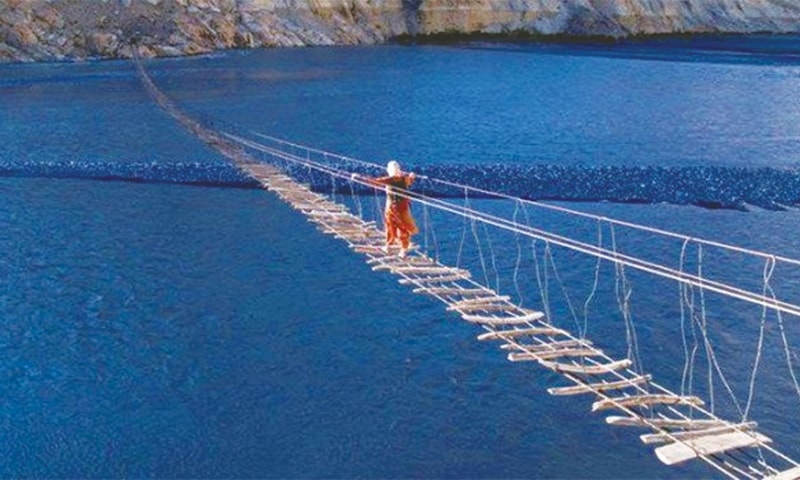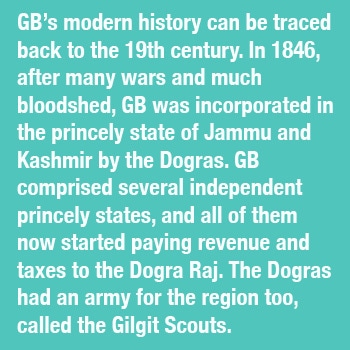JamD
SENIOR MEMBER

- Joined
- Mar 26, 2015
- Messages
- 2,238
- Reaction score
- 94
- Country
- Location
Hello everyone.
I don't usually post threads on social issues but I have some friends from GB who have been directing to me such news lately. I must confess I am not super well informed about these issues and would like to start a fruitful discussion here.
Is it possible that in our rush for the CPEC and our desire to pacify the more visible Baloch concerns we are putting the concerns of the locals of GB on the backburner?
NOTE: I would prefer only Pakistanis respond to this thread. This is not of any spite, but simply because if you're an Indian it is hard for you to not be influenced by the Indian media on this issue. There should be no discussion about India's position, concerns or designs. This is a thread about the CPEC's implementation in Pakistan. IF you have INFORMED opinions, please do contribute in a dignified manner reflective of your respectability. Also please don't respond to trolls, just report them. I would request the mods to ban trolls here. I know this thread can be troll-bait but it would be a shame if you don't discuss possibly real issues out of fear of trolls. I appreciate the mods' efforts in this regard.
http://www.dawn.com/news/1277883
GB people go on strike to seek ‘due share’ in CPEC
THE NEWSPAPER'S CORRESPONDENT
GILGIT: A shutter down strike was observed on Monday to protest central government’s alleged failure to give the people of Gilgit-Baltistan due share in the China-Pakistan Economic Corridor project.
Call for the strike, observed in Gilgit and Skardu simultaneously, was given by Awami Action Committee (AAC), an alliance of political and religious parties of the region.
Lawyers in Gilgit and Skardu boycotted court proceedings in solidarity with the ACC protest.
The AAC demands withdrawal of the decisions regarding imposition of taxes on GB people without giving them constitutional rights, cut in wheat subsidy, the mineral policy, and ending electricity shortages in the region.
As markets, shopping malls and medical stores remained closed, people in the two cities faced difficulty to get necessity items.
Public transport on the two cities’ roads and attendance in government and private schools, colleges and offices remained thin. The streets of Gilgit and Skardu wore a deserted look.
A large number of people gathered at Gadibagh Gilgti, blocking the city’s main road. The protesters chanted slogans against the federal government for not accepting their demands. Banners inscribed with slogans in favour of their demands were put up at different roads and points of the city.
Speaking to protesters, AAC convener Maulana Sultan Raees said GB people had long been protesting for their due rights, but to no avail.
He said the federal government denied GB people their appropriate rights, which created unrest among them.
Mr Raees said GB was central to the CPEC project, but unfortunately the people had totally been neglected. “The federal government has also ignored the demand of the GB people that their representatives should be given representation in the parliament of Pakistan.”
The AAC convener reminded the federal government of the fact that it were the mountains and glaciers of the region that irrigated the agricultural lands of Pakistan.
The speakers rejected the Mining Concession Rules, 2016, and said the law deprived GB people of their own resources and shifted their ownership to federal ministry of Kashmir affairs and Gilgit-Baltistan.
“GB has the potential to generate cheap hydropower, but the federal government is reluctant to initiate the projects, due to which GB people are facing 12 to 14 hours power outages daily,” regretted a participant.
The protesters said wheat subsidy was right of the GB people, adding the federal government’s decision to cut the subsidy and decrease wheat supply had caused shortage of the commodity in remote areas.
The speakers warned that the laws which had no backing of the GB people should not be implemented.
“The federal government never takes GB representatives into confidence while taking important decisions regarding the region,” lamented a speaker.
Meanwhile, civil society activists took to the streets in Danyor Gilgit against the federal government. The protesters blocked the Karakoram Highway for several hours, chanting slogans against the centre.
Published in Dawn, August 16th, 2016
I don't usually post threads on social issues but I have some friends from GB who have been directing to me such news lately. I must confess I am not super well informed about these issues and would like to start a fruitful discussion here.
Is it possible that in our rush for the CPEC and our desire to pacify the more visible Baloch concerns we are putting the concerns of the locals of GB on the backburner?
NOTE: I would prefer only Pakistanis respond to this thread. This is not of any spite, but simply because if you're an Indian it is hard for you to not be influenced by the Indian media on this issue. There should be no discussion about India's position, concerns or designs. This is a thread about the CPEC's implementation in Pakistan. IF you have INFORMED opinions, please do contribute in a dignified manner reflective of your respectability. Also please don't respond to trolls, just report them. I would request the mods to ban trolls here. I know this thread can be troll-bait but it would be a shame if you don't discuss possibly real issues out of fear of trolls. I appreciate the mods' efforts in this regard.
http://www.dawn.com/news/1277883
GB people go on strike to seek ‘due share’ in CPEC
THE NEWSPAPER'S CORRESPONDENT
GILGIT: A shutter down strike was observed on Monday to protest central government’s alleged failure to give the people of Gilgit-Baltistan due share in the China-Pakistan Economic Corridor project.
Call for the strike, observed in Gilgit and Skardu simultaneously, was given by Awami Action Committee (AAC), an alliance of political and religious parties of the region.
Lawyers in Gilgit and Skardu boycotted court proceedings in solidarity with the ACC protest.
The AAC demands withdrawal of the decisions regarding imposition of taxes on GB people without giving them constitutional rights, cut in wheat subsidy, the mineral policy, and ending electricity shortages in the region.
As markets, shopping malls and medical stores remained closed, people in the two cities faced difficulty to get necessity items.
Public transport on the two cities’ roads and attendance in government and private schools, colleges and offices remained thin. The streets of Gilgit and Skardu wore a deserted look.
A large number of people gathered at Gadibagh Gilgti, blocking the city’s main road. The protesters chanted slogans against the federal government for not accepting their demands. Banners inscribed with slogans in favour of their demands were put up at different roads and points of the city.
Speaking to protesters, AAC convener Maulana Sultan Raees said GB people had long been protesting for their due rights, but to no avail.
He said the federal government denied GB people their appropriate rights, which created unrest among them.
Mr Raees said GB was central to the CPEC project, but unfortunately the people had totally been neglected. “The federal government has also ignored the demand of the GB people that their representatives should be given representation in the parliament of Pakistan.”
The AAC convener reminded the federal government of the fact that it were the mountains and glaciers of the region that irrigated the agricultural lands of Pakistan.
The speakers rejected the Mining Concession Rules, 2016, and said the law deprived GB people of their own resources and shifted their ownership to federal ministry of Kashmir affairs and Gilgit-Baltistan.
“GB has the potential to generate cheap hydropower, but the federal government is reluctant to initiate the projects, due to which GB people are facing 12 to 14 hours power outages daily,” regretted a participant.
The protesters said wheat subsidy was right of the GB people, adding the federal government’s decision to cut the subsidy and decrease wheat supply had caused shortage of the commodity in remote areas.
The speakers warned that the laws which had no backing of the GB people should not be implemented.
“The federal government never takes GB representatives into confidence while taking important decisions regarding the region,” lamented a speaker.
Meanwhile, civil society activists took to the streets in Danyor Gilgit against the federal government. The protesters blocked the Karakoram Highway for several hours, chanting slogans against the centre.
Published in Dawn, August 16th, 2016








